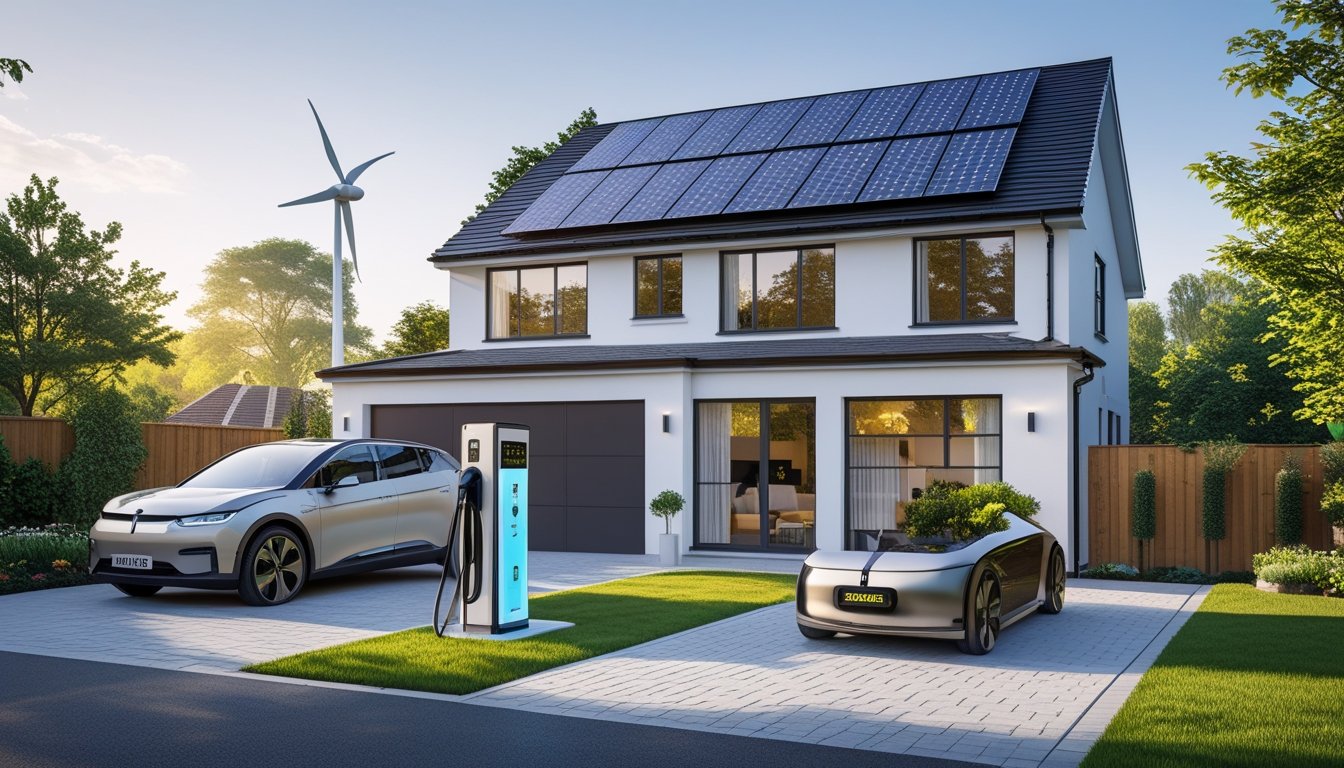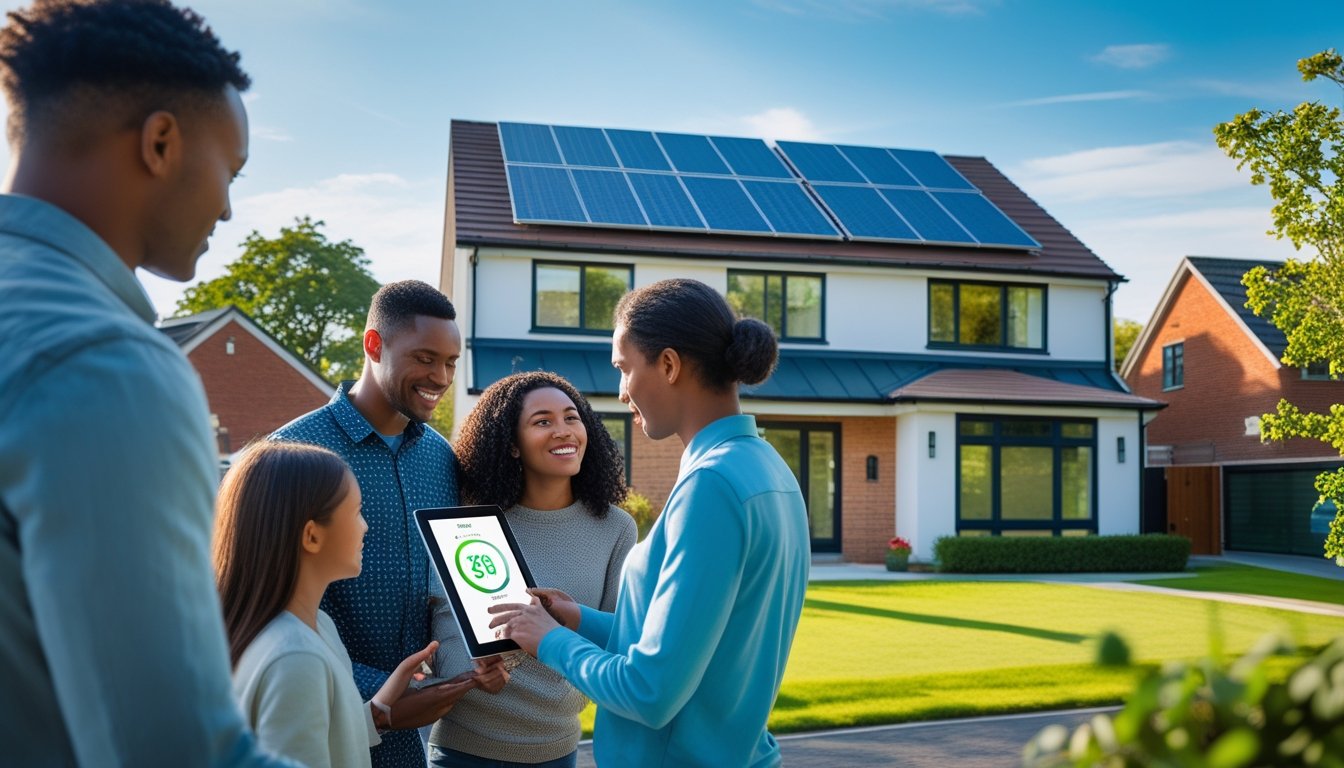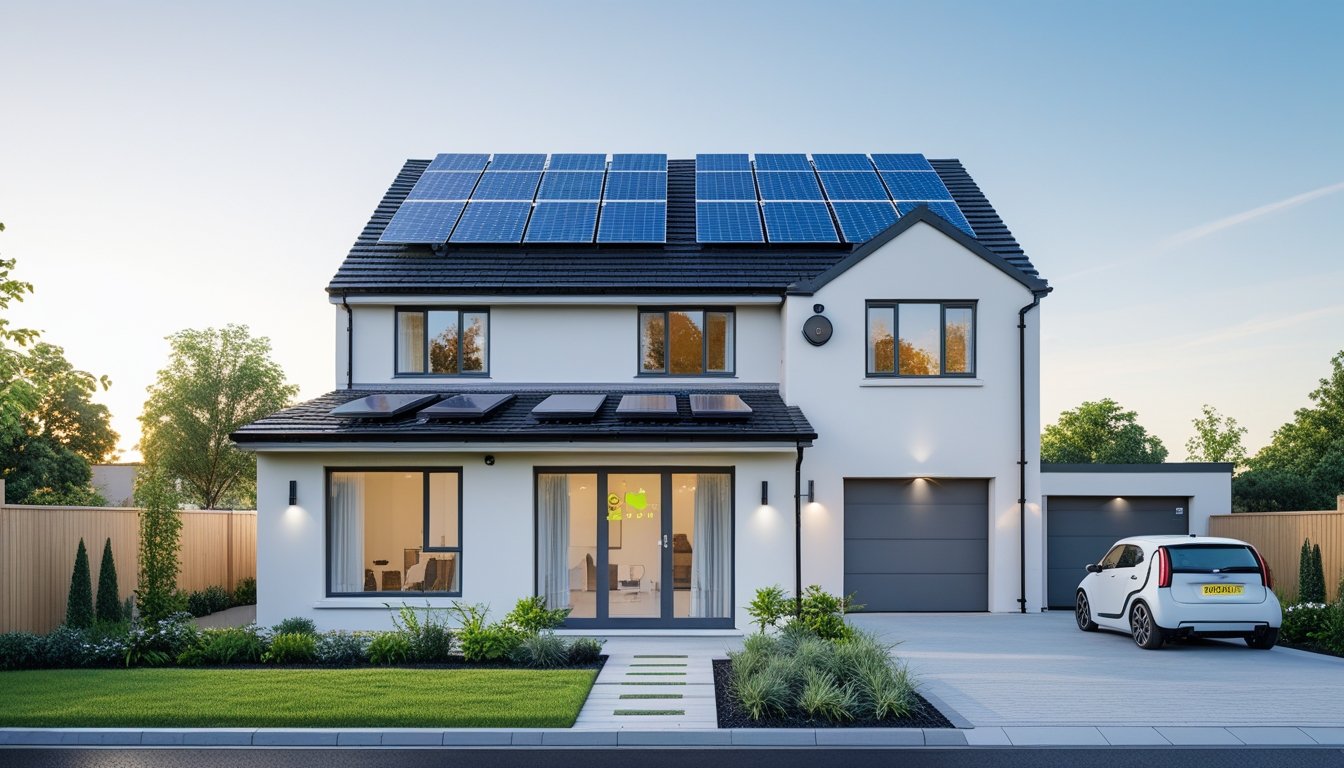Late updated: 08 Nov 2025 11:11
Written by: Eleanor Hartman
Innovative Energy-Saving Technologies For UK Homes: Transforming Efficiency
Innovative energy-saving technologies are revolutionising the way we approach home efficiency in the UK. With energy prices remaining unpredictable, integrating green technologies into our homes presents a practical solution. These advances not only promise significant financial savings but also align with our growing commitment to environmental sustainability, highlighting their importance beyond just short-term economic gains.

Our homes are increasingly equipped with cutting-edge solutions such as solar panels, heat pumps, and smart energy systems. These technologies drastically reduce carbon footprints while enhancing the comfort and utility of our living spaces. As smart technology and renewable energy continue to evolve, the potential for creating truly energy-efficient homes has never been more accessible or exciting.
Policy support and industry innovation are instrumental in driving these changes. Government incentives and evolving standards are paving the path for widespread adoption, pushing us closer to net-zero commitments. The synergy between policy, technology, and consumer adoption is not only reshaping our homes but also contributing significantly to a sustainable future.
Key Takeaways
- UK homes can achieve significant energy savings with cutting-edge technologies.
- Government policies and standards are crucial in promoting sustainable living.
- Integration of smart and renewable systems boosts energy efficiency and reduces emissions.
Core Innovative Energy-Saving Technologies for UK Homes
In the UK, the shift towards energy-efficient homes is driven by multiple innovative technologies. Advanced heat pumps, evolving solar panel technology, smart energy management, and electric vehicle charging integration play pivotal roles in reducing energy consumption and embracing renewable energy solutions.
Advanced Heat Pumps and Low Carbon Heating
Heat pumps represent a breakthrough in heating systems, profoundly impacting energy efficiency. They transfer heat rather than generate it, making them three to four times more efficient than traditional boilers. Air source and ground source heat pumps are prominent options, offering sustainable ways to regulate home temperatures.
With the UK poised to enhance its energy policies, integrating these pumps into homes aligns with net-zero commitments. Their implementation presents a viable path toward reducing carbon footprints. Although initial installation might be costly, the long-term benefits of lower energy bills and reduced emissions prove significant.
Latest Developments in Solar Panels and Photovoltaics
Solar panels have evolved remarkably to meet the increasing demand for clean energy. Photovoltaic cells now exhibit higher efficiency rates, capturing more sunlight and converting it into electricity. This progress in solar technology leads to enhanced energy production, suitable for various UK weather conditions.
Innovations in solar panel designs also contribute to better aesthetics and easier installations. Incorporating these systems into homes not only taps into renewable energy but also significantly lowers energy costs. The adoption of solar panels is facilitated by government incentives aiming at broadening their accessibility and increasing their presence in the domestic energy landscape.
Smart Home Energy Management Systems
Smart Home Energy Management (HEM) systems are transforming how we monitor and control energy use. These systems integrate with various home appliances, optimising energy consumption through real-time data and predictive analytics. They provide insights into when and where energy savings can be achieved.
The UK is embracing these systems as part of its broader energy strategy. By scheduling energy-intensive tasks during off-peak hours, HEM systems reduce grid strain and save money. This cohesive approach, supported by mobile apps and smart devices, offers homeowners enhanced control over their energy consumption, pushing forward sustainability efforts within domestic settings.
Electric Vehicle Charging Integration
Electric vehicles (EVs) are gaining traction, and seamless integration of EV charging systems into homes is crucial for their widespread adoption. Home charging units allow for flexible and efficient refuelling, significantly reducing reliance on public charging stations.
Smart charging solutions synchronise with the electricity grid to charge vehicles during clear peak periods, offering cost efficiency. This integration is vital for the UK's green transportation aims, supporting reduced emissions and fostering cleaner urban environments. The government's backing of this approach accelerates its adoption, presenting a viable option for energy-efficient living that aligns with modern transportation demands.
Policy Drivers, Standards, and the Future of Sustainable Living

In the quest for sustainable living, various policy drivers and standards play an essential role. By understanding the impact of the Future Homes Standard, the ongoing decarbonisation of industries, and the government’s role in supporting sustainability, we can inform and guide future advancements in energy-saving technologies for UK homes.
The Role of the Future Homes Standard
The Future Homes Standard is a key policy initiative in the UK aimed at ensuring new homes are designed with high energy efficiency and low carbon emissions. Set to be fully implemented by 2025, it mandates that new homes must produce 75-80% fewer carbon emissions compared to current levels. This is achieved through improvements in insulation, heating systems, and energy-efficient building materials. The Standard is expected to significantly influence the architectural and building industries by promoting advanced construction methods and technologies. As we prepare for its implementation, architects and builders are actively seeking innovative solutions to meet these new requirements, which pave the way for a more sustainable living environment.
Decarbonisation and Industry Transformation
Decarbonisation is crucial as we strive to reduce carbon footprints across various sectors including construction, manufacturing, and energy. This transformation involves adopting cleaner technologies and renewable energy sources such as solar, wind, and low-carbon heating solutions like heat pumps. Industry stakeholders are investing in research and development to advance these technologies, ensuring they are cost-effective and accessible. The shift also requires a collaborative effort among businesses, policymakers, and consumers to embrace and implement these changes. As industries transform, job creation in green technologies occurs, supporting both the economy and the environment. Our commitment to decarbonisation reflects a broader vision for achieving net-zero emissions and enhancing the sustainability of our lifestyles.
Government Incentives and Support for Sustainability
Government initiatives are vital in accelerating the adoption of sustainable practices. Through incentives like grants, tax reliefs, and subsidies, homeowners and businesses are encouraged to invest in energy-efficient technologies and sustainable design. These programmes aim to lower the financial barriers associated with adopting innovative solutions such as solar panels and home battery storage systems. Additionally, supportive policies and regulations enhance market confidence, driving innovation and investment in sustainability. Government efforts also extend to educating the public on the benefits of sustainability, fostering a culture of environmental responsibility. By aligning financial incentives with sustainability goals, we can catalyse widespread change towards a greener future.
Frequently Asked Questions

In UK homes, energy-saving technologies play a vital role in reducing utility bills and environmental impact. From solar panels and smart systems to government grants and efficient appliances, these advancements aid sustainable living.
What are the latest developments in solar panel technology for domestic use?
Recent advancements in solar panel technology include improved efficiency and aesthetics. We now see panels that blend seamlessly with traditional roofing materials. Innovations such as bifacial panels, which capture sunlight from both sides, enhance energy generation even in less sunny conditions, making them increasingly popular for UK homes.
How can smart home systems contribute to energy efficiency in modern UK households?
Smart home systems optimise energy use by automating and remotely controlling heating, lighting, and appliances. By adjusting settings based on occupancy and weather conditions, these systems reduce energy waste. Integration with renewable sources, like solar panels, enables real-time monitoring and efficient energy management, maximising both convenience and savings.
What grants are available for UK homeowners looking to install renewable energy systems?
UK homeowners can benefit from various government incentives to install renewable energy systems. The Green Homes Grant and the Domestic Renewable Heat Incentive (RHI) are examples of available schemes. These initiatives often cover a portion of installation costs, making it more affordable for homeowners to transition to sustainable energy solutions.
What are the most cost-effective insulation improvements for existing UK homes?
Upgrading insulation is one of the most cost-effective ways to improve energy efficiency. Options like loft insulation, cavity wall insulation, and floor insulation help retain heat within the home, reducing energy consumption. The initial investment is typically recovered quickly through savings on heating bills, making these improvements highly recommended.
How do heat pumps work, and what are their advantages over traditional heating systems?
Heat pumps extract heat from the air or ground and transfer it indoors to warm the home. They're highly efficient, using electricity to move rather than generate heat, which reduces carbon emissions. Unlike traditional systems, heat pumps can both heat and cool spaces, providing year-round energy-efficient climate control.
Which energy-saving appliances offer the best return on investment for UK residents?
Energy-efficient appliances, such as refrigerators, dishwashers, and washing machines with high energy ratings, deliver significant savings. They typically consume less power while maintaining performance, leading to lower electricity bills. By choosing appliances with the highest efficiency ratings, homeowners can achieve better return on investment over time through reduced energy costs.